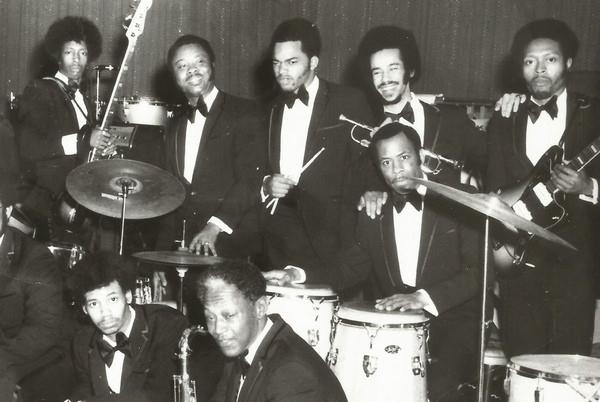The J.B.’s (sometimes punctuated The JB’s or The J.B.s) were James Brown’s band during the first half of the 1970s. On record the J.B.’s were sometimes billed under various alternate names such as The James Brown Soul Train, Maceo and the Macks, A.A.B.B., The First Family and The Last Word. In addition to backing Brown the J.B.’s played behind Bobby Byrd, Lyn Collins and other singers associated with the James Brown Revue, as well as performing as a self-contained group. The J.B.’s were formed in March 1970 after most of the members of Brown’s previous band walked out on him over a pay dispute. (Brown’s previous bands of the 1950’s and 1960’s had been known as The James Brown Band and The James Brown Orchestra.) The J.B.’s initial lineup included bassist William “Bootsy” Collins and his guitarist brother Phelps “Catfish” Collins, formerly of the obscure funk band The Pacemakers; Bobby Byrd (founder of the original Famous Flames singing group (organ), and John “Jabo” Starks (drums), both holdovers from Brown’s 60s band; three inexperienced horn players, Clayton “Chicken” Gunnells, Darryl “Hasaan” Jamison, and Robert McCollough; and conga player Johnny Griggs. This version of the J.B.’s played on some of Brown’s most intense funk recordings, including “Get Up (I Feel Like Being a) Sex Machine”, “Super Bad”, “Soul Power”, and “Talkin’ Loud and Sayin’ Nothing”. They also accompanied Brown on a European tour (during which they recorded the long-delayed live album Love Power Peace), performed on the Sex Machine double LP, and released two instrumental singles, the much-sampled “The Grunt” and “These Are the J.B.’s”. In December 1970 trombonist Fred Wesley rejoined James Brown’s organization to lead the J.B.’s. Other former Brown sidemen including Maceo Parker and St. Clair Pinckney eventually followed his lead, while the Collins brothers and most of the rest of the “original” J.B.’s left Brown to join George Clinton’s Parliament-Funkadelic collective. The J.B.’s lineup shifted frequently thereafter, and the group that had been the J.B.’s essentially disbanded following the departures of Wesley and Parker in 1976. In addition to backing Brown on stage and on record during this era, the J.B.’s also recorded albums and singles on their own, sometimes with Brown performing on organ or synthesizer. Their albums were generally a mixture of heavy funk tracks and some more jazz-oriented pieces. They scored a number of chart hits in the early 1970s, including “Pass the Peas,” “Gimme Some More,” and the #1 R&B hit, “Doing It to Death”. Credited to “Fred Wesley & the J.B.’s”, “Doing It to Death” sold over one million copies and was awarded a gold disc by the R.I.A.A. in July 1973. The 1974 album “Breakin’ Bread” is unique, in that most of the songs have a Fred Wesley spoken reminiscence dubbed onto the beginning of the song, each time over a canned backing track. This is in sharp contrast to James Brown’s real-time dominance of the proceedings on the classic “Doing It to Death” LP. A similar oddity is encountered on the other 1974 album, “Damn Right I Am Somebody”, where 20-second extensions of that album’s track-2 jam (each including James Brown’s trademark shriek) have been spliced onto the beginnings of most of the other songs. Nearly all of the J.B.’s recordings were produced by Brown, and most were released on his own label, People Records. As the short-lived style of funk music gave way in popularity to disco music in the 1970’s, the group’s material and arrangements changed accordingly. 1999’s “Bring the Funk on Down” was (mostly) a return to the early 1970’s form. Under the name A.A.B.B., the group released a single, “Pick up the Pieces One By One”, which reached #108 on the U.S. charts in 1975. The name was a reference to the then-popular funk group Average White Band and stood for “Above Average Black Band”. Like most of James Brown’s music, the J.B.’s recorded output has been heavily mined for samples by hip hop DJs and record producers. A version of the J.B.’s including Fred Wesley, Bootsy Collins, Pee Wee Ellis, Bobby Byrd and Clyde Stubblefield assembled to record the 1999 “reunion” album Bring the Funk on Down, dedicated to the memory of St. Clair Pinckney. The album was released in Japan by P-Vine Records, and in 2002 it was reissued in the U.S. by Instinct Records.
